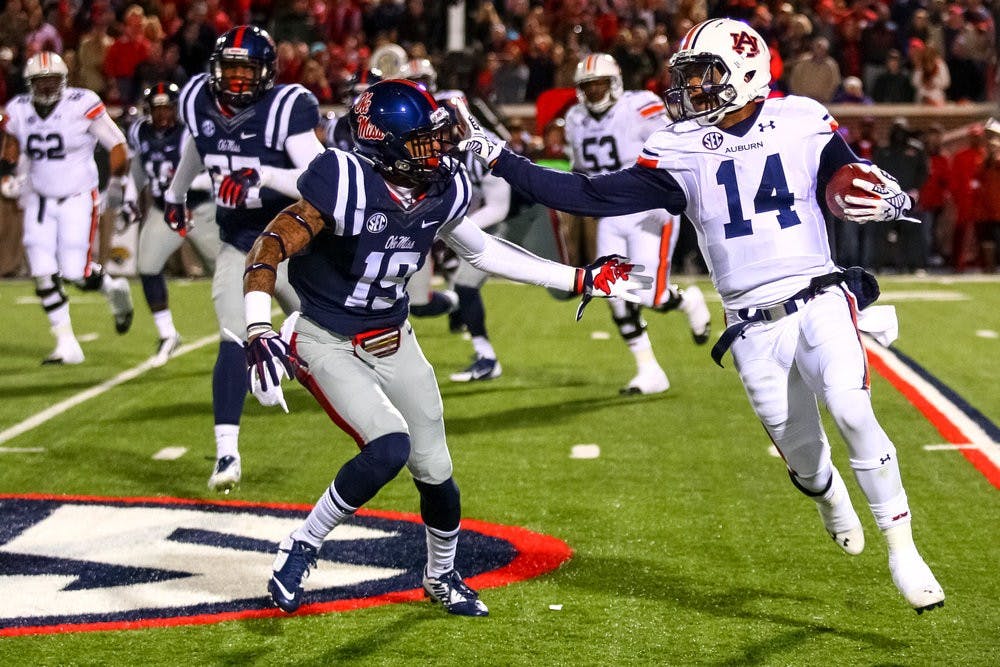Athletics department officials offered money to keep the public administration major alive, according to the findings of a committee formed by Timothy Boosinger, provost and vice-president for academic affairs.
Before the Wall Street Journal article “At Auburn, Athletics and Academics Collide” published in August made the public aware of the issue, an email from a colleague of Michael Stern, economics department chair and former University senator, brought the issue to his attention in November 2013.
The email pointed out how odd it was to have that high of a concentration of football players in a major, a term known as clustering.
During the Feb. 4, 2014 meeting of the University Senate, and a presentation by the Committee on Intercollegiate Athletics (CIA), a committee mandated by the NCAA to monitor the athletics department compliance with NCAA rules.
Mary Boudreaux, professor and director of the hemostasis laboratory in the College of Veterinary medicine and chair of the CIA in 2014, presented a slide on clustering at Auburn.
The slide showed students-athletes spread out through all of the colleges and majors.
Stern remembered the information his colleague had found and asked if there was any information on specific sports and their majors.
Boudreaux replied they did not have that information, according to transcripts of the meeting.
Later, in December 2014, the issue was raised again in a blog post, “Math Meets Football: One in 600 Billion,” by John Urschel, offensive lineman for the Baltimore Ravens and a published mathematician.
Urschel used data from Auburn on football players’ majors, mainly because it was the only top five school at the time that made the data publicly available, and concluded the odds of the high concentration of athletes in public administration was one in three undecillion, or 3,000,000,000,000,000,000,000,000,000,000,000,000. The same odds as flipping a coin 125 times in a row and landing on heads, according Urschel.
In the February 2015 University Senate meeting, during the presentation by the CIA, Stern again came back and asked about clustering in specific programs, and again was told there was no information on it.
However, an email obtained by Stern through a Freedom of Information Act request was sent on Feb. 20, 2014 to Boosinger from an athletics official that detailed the public administration major had 57 student-athletes out of 111 students enrolled.
“Typically, when there’s been the academic scandals, they almost always find a cluster,” Stern said. “So it’s not that a cluster implies a scandal, but it just seems like every time there’s a scandal, you find a cluster.”
Boosinger formed the a committee to look into clustering after Stern pushed to have issue put on the University Senate’s agenda in May.
Daniel Svyantek, professor of psychology, was appointed chair of the committee.
The committee presented their findings at the Oct. 20 University Senate meeting.
“One of the things that surprised me was how common this is,” Svyantek said.
The NCAA 40-60-80 rule, which states an athlete must complete 40 percent of their major by their sophomore year, 60 percent by their junior year and 80 percent by their senior year; is a major factor in an athlete’s decision to pick a major.
“So they tend to look for majors that that don’t have a lot of lab or those types of courses,” Svyantek said.
The committee confirmed the Wall Street Journal’s report that the athletics department offered money to keep the public administration major alive, but the offer was not accepted.
Boosinger released statements to the press after the WSJ report.
“I identified resources to make it unnecessary to close a viable and long-established undergraduate program,” Boosinger said in the statement. “I did this within my scope of authority and budget as Auburn's chief academic officer. None of those resources came from Athletics. That is a boring story, I fear, but it is the truth.”
Svyantek said his committee recommended publicizing anytime the athletics department supports academics.
“If you’re going to do it, I’d say get some publicity out of it,” Svyantek said. “That’s basic marketing.”
Do you like this story? The Plainsman doesn't accept money from tuition or student fees, and we don't charge a subscription fee. But you can donate to support The Plainsman.





